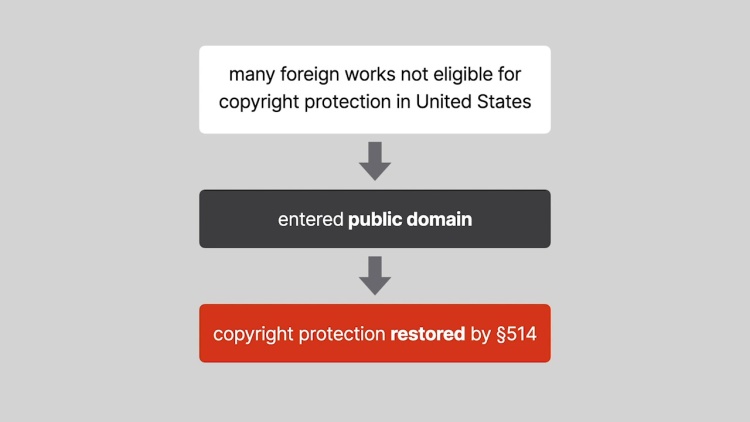Golan v. Holder
United States Supreme Court
565 U.S. 302, 132 S.Ct. 873, 181 L.Ed.2d 835 (2012)
- Written by Nicholas Decoster, JD
Facts
In 1989, the United States joined the Berne Convention for Protection of Literary and Artistic Works (Berne Convention), the primary agreement governing international copyright concerns. In order to comply with the principles of the Berne Convention, Congress granted a full term of domestic copyright protection to works by foreign authors still protected abroad. The law was enacted in § 514 of the Uruguay Round Agreements Act and extended copyright protection to foreign works still protected abroad that would have been protected had the United States followed the principles of the Berne Convention at the time of authorship. The protection under § 514 was limited to works that still enjoyed protection abroad but included works previously available via the public domain in the United States. The copyright owners of these works could not demand retroactive compensation for previous exploitation but could request compensation from parties wishing to use the works moving forward. To cushion the blow for parties in the United States who had relied on the free exploitation of now-protected works, § 514 also stipulated a grace period and several other ameliorating conditions. A group of parties (plaintiffs) who had benefitted from the free use of now-protected works filed a suit to declare § 514 unconstitutional as a violation of both the Copyright Clause and the First Amendment of the U.S. Constitution, arguing that works previously in the public domain were not eligible for copyright protection. The matter ultimately came before the United States Supreme Court.
Rule of Law
Issue
Holding and Reasoning (Ginsburg, J.)
What to do next…
Here's why 911,000 law students have relied on our case briefs:
- Written by law professors and practitioners, not other law students. 47,100 briefs, keyed to 997 casebooks. Top-notch customer support.
- The right amount of information, includes the facts, issues, rule of law, holding and reasoning, and any concurrences and dissents.
- Access in your classes, works on your mobile and tablet. Massive library of related video lessons and high quality multiple-choice questions.
- Easy to use, uniform format for every case brief. Written in plain English, not in legalese. Our briefs summarize and simplify; they don’t just repeat the court’s language.





